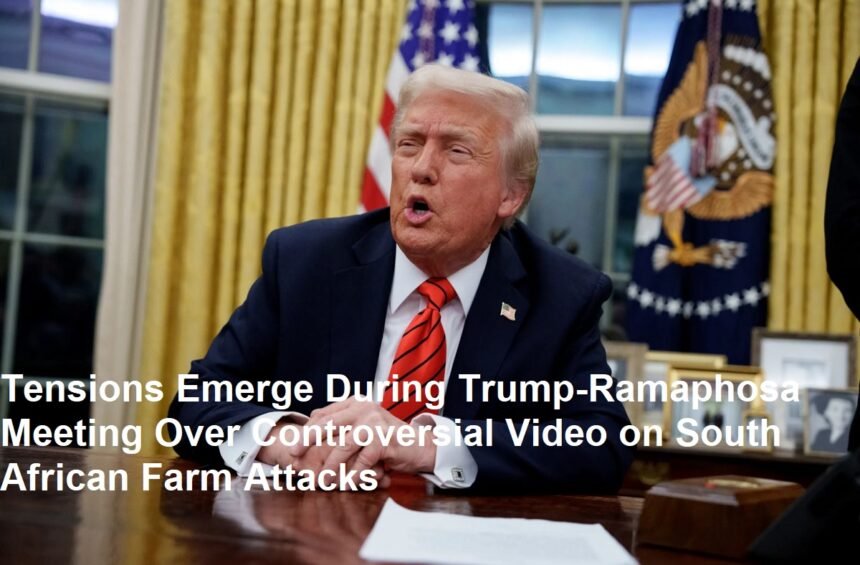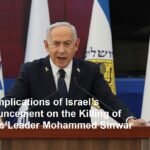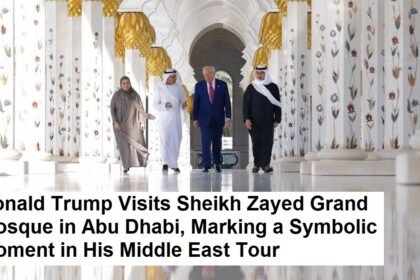The meeting between then-President of the United States, Donald Trump, and South African President Cyril Ramaphosa at the White House marked a significant moment in diplomatic relations between the two countries. However, the encounter was overshadowed by tension and controversy after President Trump played a video related to the violence against white farmers in South Africa. This unexpected move not only disrupted the tone of the meeting but also sparked debates on racial tensions, media representation, and international diplomacy.
During the official visit, aimed at strengthening bilateral ties and discussing economic cooperation, the atmosphere dramatically shifted when President Trump introduced a video that depicted graphic images and narratives of attacks on white farmers in South Africa. These farm attacks have been a point of domestic concern within South Africa, where discussions about land reform, crime, and racial inequality persist. The video highlighted alleged instances of violence, which some international observers and right-wing groups claim point to a targeted campaign against white farmers. However, this narrative is contested within South Africa and internationally, where many experts argue that the situation is more complex than portrayed.
President Ramaphosa’s reaction was notably restrained but firm. He reminded the audience that South Africa is a sovereign nation with a constitutional democracy committed to justice and equality. The tensions revealed an underlying divergence in how both leaders approached the topic of race and social justice. While Trump’s decision to play the video could be seen as an appeal to his political base, which frequently emphasizes issues of crime and racial disparities, Ramaphosa was cautious not to allow this portrayal to define South Africa’s broader social and political landscape.
The controversy is situated within a larger context of land reform in South Africa, a sensitive and multifaceted issue rooted in the country’s history of apartheid and colonial dispossession. The South African government has been pursuing policies aimed at redistributing land to address historical inequalities, which has led to heated domestic debates. Some factions have expressed concerns about safety, especially within white farming communities, who make up a small minority in the country. However, many analysts point out that violence in rural areas affects all racial groups and that the narrative of “white genocide” often used internationally is an oversimplification that exacerbates racial divisions.
International media outlets and political commentators responded to the incident with varying views. Critics argued that Trump’s move was a provocative tactic that undermined diplomatic decorum and injected racial controversy into what could have been a constructive dialogue on economic and security issues. Supporters defended it as raising awareness about a legitimate issue that requires global attention. This incident underlines how international diplomacy can be disrupted by domestic politics, and how issues with deep historical roots can be sensitive to foreign involvement.
For South Africa, the incident underscored the challenges it faces on the world stage in managing perceptions and maintaining its image as a progressive, reconciliatory democracy. President Ramaphosa’s calm but clear response reflected a desire to maintain dignity and focus on cooperation rather than confrontation. It also highlighted the need for nuanced understanding and dialogue around such a sensitive subject, a task made more complicated by external political agendas.
In conclusion, the heated moment during the Trump-Ramaphosa meeting over the farm attack video encapsulates the complexities of international relations when domestic issues of racial tension and historical injustice come to the fore. It serves as a reminder that diplomatic engagements require careful consideration of context, propriety, and respect for sovereignty. Both nations faced the challenge of balancing political realities at home with the imperative to foster constructive international partnerships. The episode remains a case study in the intersection of media, politics, and diplomacy in addressing contentious social issues.









